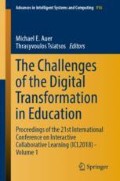Abstract
Educational institutions often struggle to identify what is the best pedagogical approach to engaging students with academic integrity content. As student plagiarism and cheating frequently occur, new strategies are needed to address this challenge in educational settings. The Canadian academic integrity mobile technology project developed one digital strategy, Integrity Matters, to enhance student academic integrity knowledge and understanding using an innovative pedagogical approach. Best strategies, from 774 undergraduate student users perspective, for accessing, delivering, assessing and learning this information with mobile technology (m-learning) are explored. Following completion of the six lessons and subsequent quizzes, academic integrity knowledge increased for the research study participants in engineering, math, computer science, and arts faculties. The Integrity Matters open access trilingual mobile application (available in Android and iOS) can be readily adopted across post-secondary colleges and universities and adapted to meet institutional priority needs.
Access this chapter
Tax calculation will be finalised at checkout
Purchases are for personal use only
References
Definition of Academic Integrity. http://www.yorku.ca/spark/academic_integrity. Accessed 01 Aug 2018
Ally, M.: Designing effective learning objects for distance education. In: McGreal, R. (ed.) Online Education Using Learning Objects, chap. 6, pp. 87–97. Routledge Falmer, London (2004)
Batane, T.: Turning to turnitin to fight plagiarism among university students. Educ. Technol. Sci. 12(2), 1–12 (2010)
Batane, T.: Can turnitin be used to provide instant formative feedback? Br. J. Educ. Technol. 42(4), 701–710 (2011)
Boehm, P.J., Justice, M., Weeks, S.: Promoting academic integrity in higher education. Community Coll. Enterp. 15(1), 45–61 (2009)
Cole, S., Kiss, E.: What can we do about student cheating. About Campus 5(2), 5–12 (2000)
Dee, T.S., Jacob, B.A.: Rational ignorance in education. A field experiment in student plagiarism. J. Hum. Resour. 47(2), 397–434 (2012)
Gallant, T.B.: Moral panic: the contemporary context of academic integrity. ASHE High. Educ. Rep. 33(5), 1551–6970 (2008)
Gallant, T.B.: Building a culture of academic integrity. Technical Report, A Magna Publications White Paper, Madison, WI (2011). https://www.depts.ttu.edu/tlpdc/Resources/Academic_Integrity/files/academicintegrity-magnawhitepaper.pdf
Glendinning, I.: Responses to student plagiarism in higher education across Europe. Int. J. Educ. Integr. 10(1), 4–20 (2014)
Hanbidge, A.S., Sanderson, N., Tin, T.: Using mobile technology to enhance undergraduate student information literacy skills: a Canadian case study. IAFOR J. Educ. Technol. Educ. Spec. Ed. 3(2), 108–118 (2015)
Herrington, A.J., Herrington, J.A.: Authentic mobile learning in higher education. In: Proceedings of the Australian Association for Research in Education (AARE) International Educational Research Conference, pp. 1–9 (2008)
Macfarlane, B., Zhang, J., Pun, A.: Academic integrity: a review of the literature. Stud. High. Educ. 39(2), 339–358 (2014)
Scanlan, C.L.: Strategies to promote a climate of academic integrity and minimize student cheating and plagiarism. J. Allied Health 35(3), 179–185 (2006)
Stappenbelt, B., Rowles, C.: The effectiveness of plagiarism detection software as a learning tool in academic writing education. In: The 4th Asia Pacific Conference on Educational Integrity (4APCEI (01 2010))
Acknowledgements
The authors wish to acknowledge research funding support from eCampusOntario. Also, the authors acknowledge support from the University of Waterloo, Renison University College and Trinity Western University.
Author information
Authors and Affiliations
Corresponding authors
Editor information
Editors and Affiliations
Rights and permissions
Copyright information
© 2020 Springer Nature Switzerland AG
About this paper
Cite this paper
Hanbidge, A.S., Tin, T., Tsang, H.H. (2020). Academic Integrity Matters: Successful Learning with Mobile Technology. In: Auer, M., Tsiatsos, T. (eds) The Challenges of the Digital Transformation in Education. ICL 2018. Advances in Intelligent Systems and Computing, vol 916. Springer, Cham. https://doi.org/10.1007/978-3-030-11932-4_89
Download citation
DOI: https://doi.org/10.1007/978-3-030-11932-4_89
Published:
Publisher Name: Springer, Cham
Print ISBN: 978-3-030-11931-7
Online ISBN: 978-3-030-11932-4
eBook Packages: Intelligent Technologies and RoboticsIntelligent Technologies and Robotics (R0)

